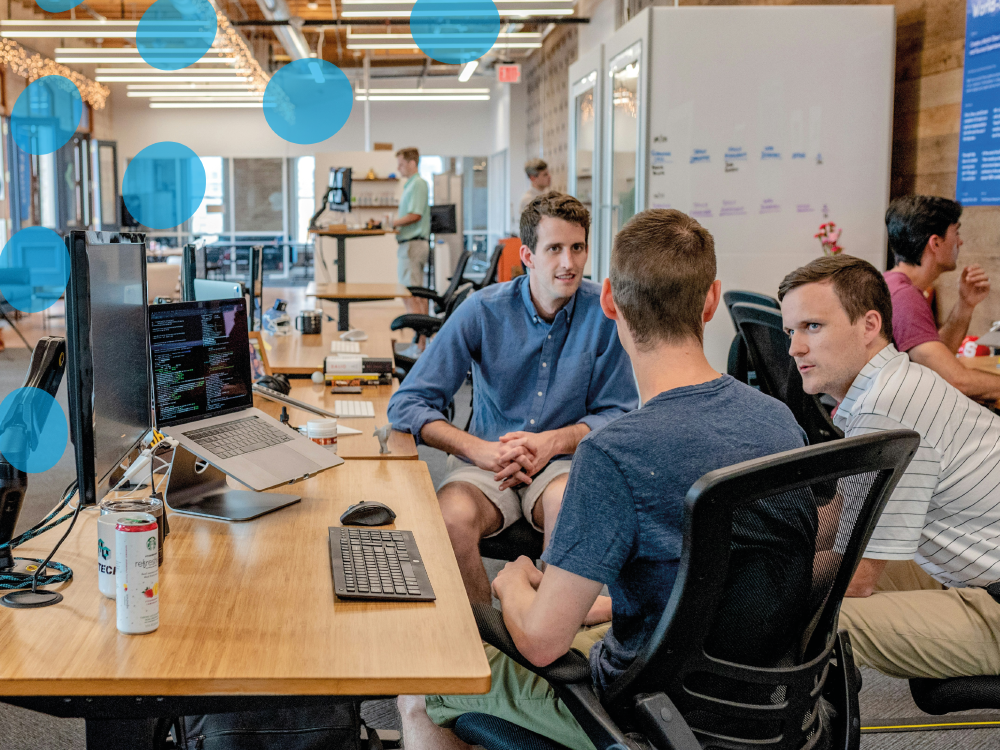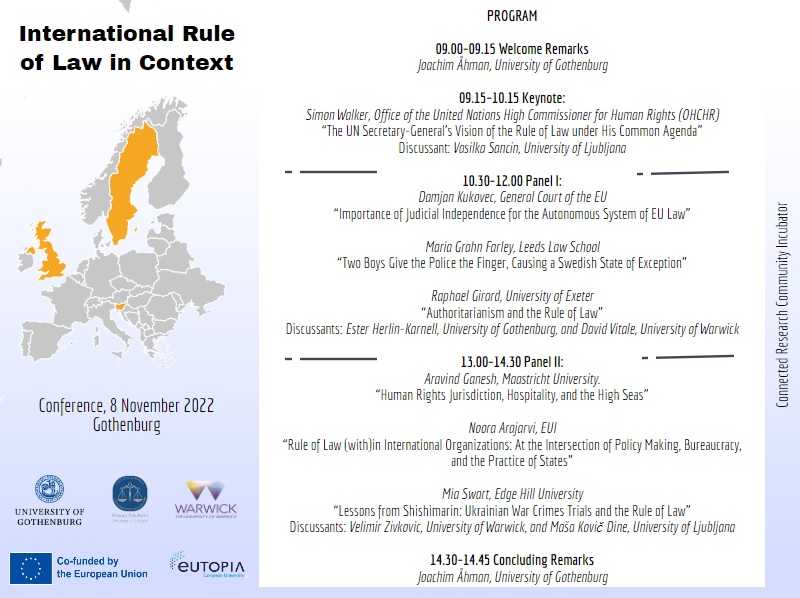You are here :
- EUTOPIA website
- Home
- Portfolio
- CC
- CRC
Connected Research Communities Incubators

Copyright Austin Distel/Unsplash
One of the long-term objectives of the EUTOPIA alliance is to set up sustainable researcher networks. EUTOPIA Connected Research Communities Incubators aims to connect research initiatives across EUTOPIA and beyond and enable researchers and innovators to grow their ideas in any science and technology field by sharing them with their peers. The EUTOPIA Connected Research Communities is a bottom-up call for networks focusing on activities related to a global challenge or SDG to boost societal, economic, political and/or scientific impact.
EUTOPIA for Planetary Wellbeing: Sustainable Partnerships
Contact Person: Lela Mélon
Partner Universities:
University of Ljubljana, Pompeu-Fabra University-Barcelona
TRAPTS: Trans-policy Perspectives on Transformations in Sovereignty
Contact Person: Jamal Shahin
Partner Universities:
Vrije Universitet Brussel, University of Gothenburg, University of Warwick
International Rule of Law
Contact Person: Joachim Åhman
Partner Universities:
University of Gothenburg, University of Ljubljana, University of Warwick
CRC Tourism and Experience
Contact Person: Eva Maria Jernsand
Partner Universities:
CY Cergy Paris University, University of Gothenburg, Pompeu-Fabra University-Barcelona
Law & Philosophy UPF-UL
Contact Person: José Luis Martí
Partner Universities:
University of Ljubljana, Pompeu-Fabra University-Barcelona
Gender and Power: How to Combat Gender Inequalities in Our Societies Today
Contact Person: Lissell Quiroz
Partner Universities:
CY Cergy Paris University, University of Gothenburg, University of Ljubljana
Intangible Cultural Heritage and Sustainable Development
Contact Person: Chiara Bortolotto
Partner Universities:
Vrije Universitet Brussel, CY Cergy Paris University
Mobility Of Students in Teacher Education - MOST
Contact Person: Irma Brkovic
Partner Universities:
University of Gothenburg, University of Ljubljana
Photography and Dissent. Image Circulations In and Out of Public Discourse
Contact Person: Katarzyna Ruchel-Stockmans
Partner Universities:
Vrije Universitet Brussel, CY Cergy Paris University
Check out the CRC's website
History, Identity, and Linguistic Diversity
Contact Person: Christopher Strelluf
Partner Universities:
Vrije Universitet Brussel, University of Gothenburg, University of Ljubljana, Pompeu-Fabra University-Barcelona, University of Warwick
Active Eutopia
Contact Person: Fernando Peruani
Partner Universities:
CY Cergy Paris University, University of Gothenburg, University of Ljubljana, University of Warwick
Linguistic Interaction between Humans and AI (LIHAI)
Contact person: Petter Sutton
Partner universities:
University of Gothenburg, Pompeu-Fabra University-Barcelona
Research for Inclusive Education
Contact Person: Muriel Epstein
Partner Universities:
Vrije Universitet Brussel, CY Cergy Paris University, Pompeu-Fabra University-Barcelona
Sustainable European Private International Law (SEPIL)
Contact Person: Jachin Van Doninck
Partner Universities:
Vrije Universitet Brussel, University of Gothenburg, University of Ljubljana
Sustainable Catalysis by Design
Contact person: Mark Greenhalgh
Partner Universities:
Vrije Universitet Brussel, University of Warwick
EUTOPIA - Durable Materials CRC
Contact Person: Iris de Graeve
Partner Universities:
Vrije Universitet Brussel, University of Gothenburg, University of Warwick
Primary Co-cultures in Liver on Chip (PicLOC)
Contact Person: Caroline Beck Adiels
Partner Universities:
Vrije Universitet Brussel, University of Gothenburg
- Local Contact
-
For general enquiries: eutopiacrc@gu.se
Local Programme Managers:
-
Vrije Universiteit Brussel: RD.secretariaat@vub.be
-
CY Cergy Paris University: Karine Gambier-Leroy, Secretary-General of the Institute for Advanced Studies, CY Cergy Paris University, karine.gambier-leroy@cyu.fr
-
University of Gothenburg: Andreea Maris, Grants and Innovation Office, University of Gothenburg, andreea.maris@gu.se
-
University of Ljubljana: Rebeka Lesjak,
-
University of Ljubljana Office for Research, rebeka.lesjak@uni-.lj.si
-
Pompeu Fabra University: Mireia Calm, eutopia@upf.edu
-
University of Warwick, warwickineurope@warwick.ac.uk
-
- EUTOPIA CRC Conference on "International Rule of Law in Context"
-
Within the EUTOPIA European University alliance framework, the University of Gothenburg, the University of Ljubljana, and the University of Warwick are organising a digital conference on the theme “International Rule of Law in Context”, on 8 November 2022. The keynote Speaker is Simon Walker, Chief, Rule of Law and Democracy Section, Office of the United Nations High Commissioner for Human Rights (OHCHR). Researchers, teachers, practitioners, and students are welcome. No reservation is needed.
The “Rule of Law” is a familiar concept in legal research. It has been defined differently, but at the core lies the principle that a society should be governed under the laws. Public power should not be exercised arbitrarily. This idea goes back to antiquity and has been an important part of the evolution of our modern nation-states. However, in the present globalised world, a significant amount of public power is exercised at the international level when states enter into agreements with each other and establish international organisations and courts. An important example is, of course, the European Union (EU). But there are also many other examples. It can even be argued that the Rule of Law plays an important role when assessing the constituent parts of the international legal order itself as a system of governing sustainable relationships between societies. Therefore, it also makes sense that promoting the Rule of Law at the international level is mentioned as a target under UN Sustainable Development Goal 16.
While research about Rule of Law issues at the national level is comprehensive, research about such issues at the international level is more limited. Moreover, since international law is a very broad field, the Rule of Law does not necessarily play the same role in different contexts. The conference gathers researchers and practitioners who have worked with and approached Rule of Law issues in different ways within different international law contexts. The purpose is to explore what these different contexts can learn from each other.
The detailed programme of the event can be found below. The link for online participation can be accessed here.

EUTOPIA MORE is co-funded by the European Union under Grant Agreement No. 101089699. Views and opinions expressed are, however, those of the author(s) only and do not necessarily reflect those of the European Union or the European Education and Culture Executive Agency (EACEA). Neither the European Union nor EACEA can be held responsible for them.



